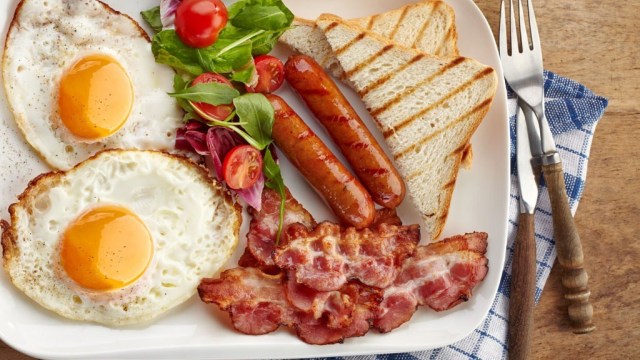Morning Protein Meal | Slimmer & Stronger – Why?

Best Brain Boosters – Review | Nootropics is the future
February 24, 2020
MK-677 Ibutamoren Review | A Selective Androgen Receptor Regulator (SARM)?
March 10, 2020Morning Protein Meal …
As the day starts, the body requires energy, so the breakfast is considered as the “king” of meals.
“In the morning eat like a king, at noon like a lord and in the evening as a beggar”, people say, expressing in a way the rule to be applied on our daily meals.
The amount and the type of food consumed in the morning are the two important parameters under review.
Every individual has its own habits, a fact verified by the various answers received when the same question is asked to different persons. Certain persons have a full meal as breakfast, while others drink just a cup of coffee, before leaving for work. Eggs and bacon for some, or chocolate croissants for others.
However, how breakfast affects our fitness, health, weight, or activity and psychology throughout the day?
In the morning, the “machine” can never start with a single coffee.
You may not feel hungry, or you feel you need just a strong coffee to wake you up to get to work.
Nevertheless, this is a huge mistake.
All night the body is under a type of fast for about 8 hours, so needs energy in the morning to perform all basic functions. Even if you don’t feel hungry, the body needs “fuel” for all vital organs to work, including the brain.
Skipping a meal – and especially the breakfast – may have serious consequences on the way your body works, on the appetite and the rate at which foods are metabolized.
You don’t need big amounts if you feel you don’t need it, but a small but “smart” snack is capable of boosting your body, regulating the metabolism, sharpening your thinking and perception, even uplifting the mood.
Croissants or eggs?
What is Morning Protein Meal ?
As mentioned, various habits on food and taste on breakfast exist among the people. Certain persons prefer a protein rich breakfast (eggs and bacon, per example), while others take a rich carbohydrate and sugar breakfast (such as croissants, cakes, donuts, muffins, butter & jam bread, buttermilk, even with butter & honey).
Which is the right or the wrong, after all?
Protein meals may not give you this instant energy boost felt with sugar and carbohydrates, but they provide large amounts of energy for longer time.
On the other hand, carbohydrates offer a sudden boost of energy, soon feeling tired and hungry again.
Besides, both carbohydrates and sugar consumed in the meals offer “empty” calories, meaning they provide high calorie value (which will end up as fat in different body parts) and zero nutritional value (since provide absolutely no nutrients).
A little exception with honey, sesame pulp or even hazelnut praline, however, their nutritional value cannot offset the caloric “overload” caused on the body.
However, it can be a special breakfast meal once a week (on Sundays), so you don’t feel like you miss something you really love.
What’s the amount of protein required?
Daily protein intake – as defined by nutrition and health experts – is not the same for both sexes. Different requirements apply for a man’s body, while others are necessary for a woman’s body.
Indicatively – as the figure is affected by other parameters such as lifestyle, frequency & intensity of workouts – for men the protein intake for all-day meals is about 56 grams, while for women it is just 46 grams.
No carbohydrates available as option?
Surely, they exist as an option. No one argues that carbohydrates should be removed from a diet and if some diets demand it, then we are definitely talking about a “rape” of body, exposing it to high risk.
As proteins are important for the body, so are carbohydrates. However, as with everything in life, everything needs a measure and knowledge to become the most useful and effective way.
Carbohydrates are the nutritional element to offer huge amounts of energy, like an extra stimulation energy injection into organism.
To get carbohydrates more “useful” for organism, make sure they contain more dietary fiber. Fiber slows down the digestion process and keeps the person energized and appetite feeling covered for longer.
So opt for whole grain (bread, cereals, flour) and ideally combine them with fruits for providing extra fiber and lots of nutrients and vitamins.
For example, a slice of whole-wheat bread (low fat) and turkey, along with a banana or apple, is a great breakfast meal to offer a lot of energy, keep you fit and prevent unnecessary weight gain.
Try to get out of the ordinary.
The big “mistake” with breakfast meal is that we all resort to the same classic breakfast suggestions.
Sometimes in a hurry, or boredom, sometimes by a lack of cooking skills, we resort to easy and “boring” suggestions for breakfast.
Morning Protein Meal : What’s wrong, or right?
Basically, it’s not wrong to eat cereal with milk, nor toast or even a muffin.
However, following a brief research in immediate surroundings, there are few selecting to add fruit to their breakfast meal and even fewer (if non-existing) are those choosing to add vegetables to their breakfast meal.
However, fruits and vegetables are the healthiest addition to a full breakfast meal, full of valuable vitamins and benefits for organism.
Certainly they can (and should be) supplemented with protein foods as well as carbohydrates (preferably whole grains) to form a full breakfast meal providing a high amount of energy and suppressing the appetite for a long time.
It is very simple to enrich a breakfast in the right way. Simply add in the salty muffin prepared from previous day, chives and spinach, goat cheese and boiled turkey.
Add tomatoes and greens in your toast (except cheese and turkey).
Make a sandwich with avocado, egg and bacon.
Add a banana, an apple or some strawberries to your snack for breakfast.
Drink freshly squeezed juice with your classic breakfast meal.
Add fresh strawberries or berries, slices of apple cinnamon, or banana with a few slices of health chocolate to your milk cereal.
It’s not difficult. You don’t have to be a great chef.
After all, is perfectly healthy and beneficial for the organism, boosting the metabolism and preventing forming new adipocytes.
Is a fruit & vegetable juice the right breakfast?
Juice alone is not a full breakfast meal and I think the reason is clear.
To have a full breakfast, all necessary nutrients providing the body with the nutrients and energy required to continue its day, should be included.
Indeed, fruits and vegetables – as already pointed out – are perfect for breakfast, but not providing sufficient amount of fiber as desired, simply because when fruits and vegetables are processed, a large amount of precious fiber is disintegrated and eliminated.
Besides, a fruit and vegetable juice can provide vitamins, but provides not any protein to organism, as a necessary nutrient (and especially in breakfast).
A good solution is to prepare a smoothie instead of a natural juice, so using the favorite fruits and vegetables and adding yogurt to get the protein required.
If you choose to eat a handful of nuts (providing a good amount of carbohydrates & energy) you will have a super-tasty and beneficial breakfast meal to keep you full for hours.
Protein breakfast for diabetes
According to a relatively recent study, 48 people (overweight & type 2 diabetes patients) were divided into 3 groups. Each of these groups consumed a different breakfast amount for 23 months (as long as the experiment’s time).
1st group: great breakfast (660 calories)
2nd group: mid-morning meal (567 calories)
3rd group: small breakfast meal (276 calories)
At the end of the 23 months period, the results collected and reported for each group studied.
Note that not only was the amount of meals different but also their content. The researchers made sure to provide whey protein, dietary protein and carbohydrates to each of the 3 groups.
The results showed a significantly higher weight loss in the whey protein group. That is, the breakfast with the highest protein intake was the one favoring the largest increase in metabolic rate and, consequently, the weight loss.
The people in this group were more satisfied and significantly less hungry during the day.
Another important remark from this study was that protein intake at breakfast (and in particular whey protein) provided a significant reduction in hemoglobin A, resulting in a lowering of glycemic index after meals during the day, compared to other diet programs known.
This is also a very important reason to be recommended as a dietary habit for people with type 2 diabetes.








